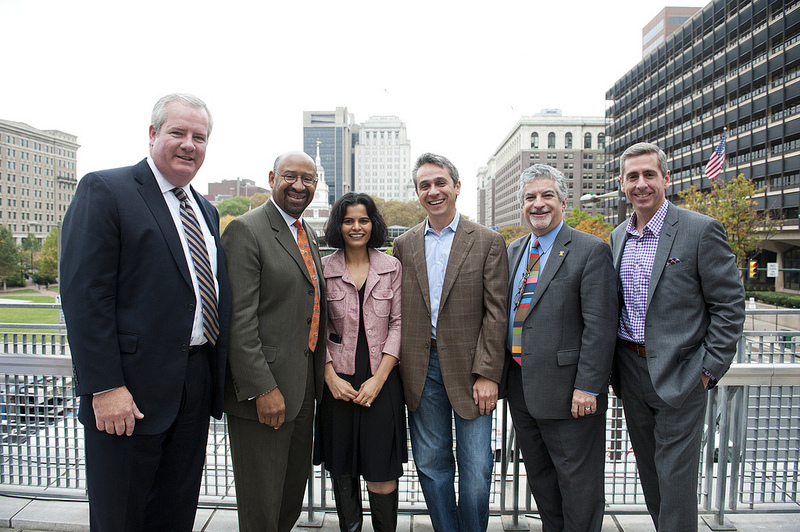One year after its first and only public investment to date, the City of Philadelphia’s StartUp PHL fund for local early-stage startups will announce tomorrow four new investments totaling $700,000.
The startups are vendor payment company Tesorio, “Github for things” company Squareknot, online apartment guide VeryApt and medical device company Velano Vascular.
But the bigger news speaks to how StartUp PHL made three of those investments: via a new angel fund.
StartUp PHL was originally planned as a $6 million investment fund where a venture capital firm — First Round Capital, in this case — would invest alongside the Philadelphia Industrial Development Corporation, the city’s economic development agency. PIDC gave First Round full control of which startups to fund (leave the investing to the experts, the thinking went).
That meant that companies had to meet First Round’s notoriously tough criteria (the firm passes on 99 percent of startups they see, said First Round managing partner Josh Kopelman) before they could get a StartUp PHL investment.
The angel fund is a way for StartUp PHL to invest in startups that aren’t quite ready for a First Round Capital investment, said Kopelman, who kept seeing startups that were “still a little too early” for First Round.
“Every venture firm has their own bar,” Kopelman said in an interview last week. “The angel fund is an opportunity to set a different bar.” A lower bar, even.
Instead of First Round Capital investing alongside the city, it will be Kopelman (wearing his angel investor hat) and an undisclosed group of angels. The angel fund will make smaller investments ($100,000) than the seed fund (roughly $200,000-$400,000).
Still, the total remaining amount of StartUp PHL money remains the same.
The move to create an additional fund seems borne of the entrepreneurial spirit: Try something based on an assumption — “There are Philadelphia startups ripe for First Round investment.” Oh, maybe not? Change it. Try again.
But is it also admitting defeat?
Kopelman is quick to say that the angel fund was not created due to a lack of entrepreneurs ready for First Round investment, rather it was created because he saw another opportunity to bolster the Philadelphia tech scene.
“We weren’t afraid of not doing enough,” he said. “The question was, ‘How can we do more?'”
When asked if the creation of the angel fund speaks to the maturity of Philadelphia’s tech scene, Kopelman said that StartUp PHL is still too young to draw any conclusions from. There are years when First Round finds many startups to invest in and years it doesn’t.
“I don’t think you could measure the health of an entrepreneurial ecosystem over a six- or 12-month period of time,” he said.
For the city, it’s a matter of where StartUp PHL can make a difference, no matter at what stage of a company, said deputy mayor and commerce director Alan Greenberger.
“The community needs to have funding at all levels,” he said, “and Josh really verified for us that the angel and seed sides were where we could have impact.”
One thing the angel fund does signify? The City of Philadelphia's willingness to support its tech scene, despite the risk of failure.
Venture capital, as Kopelman put it, is a risky business. Angel investing is even riskier, with smaller checks meaning startups have less opportunities to fail and try again.
“Despite all of our best efforts to make StartUp PHL [angel] companies successful, more of them are going to fail,” he said. “But that’s what being a startup is, it’s taking that risk. I applaud Philadelphia for being willing to take that risk.”
How does a city negotiate taking a risk like that? For one, you leave the investment decisions to the experts, as the city has and will continue to do.
But the city’s also a different kind of investor — it’s not looking for the same returns that other venture capital firms are.
“We were never in it purely for the investment,” Greenberger said. “It’s all about supporting a community.”
He said this is another way to do that.
###
Below, find a list of the StartUp PHL investments being announced tomorrow (two of the four were founded by Wharton MBAs). Aside from the ones announced and the first investment (Real Food Works), StartUp PHL has made one other seed fund investment but it is still not public, according to the a release.
- Tesorio ($100,000)
- VeryApt ($100,000)
- Squareknot ($100,000)
- Velano Vascular ($400,000)*
*StartUp PHL Seed Fund investment.
The city also announced that its StartUp PHL “Call for Ideas” grant is accepting submissions until Jan. 2, 2015.
ApplyJoin our growing Slack community
Join 5,000 tech professionals and entrepreneurs in our community Slack today!
Donate to the Journalism Fund
Your support powers our independent journalism. Unlike most business-media outlets, we don’t have a paywall. Instead, we count on your personal and organizational contributions.

Traditional PPE isn’t made for everyone. Here’s how one startup is fixing it.

Comcast introduces ultra-low lag Xfinity internet that boosts experiences with Meta, NVIDIA and Valve

This Canadian startup with a network of 100,000 is helping international college students find their careers


